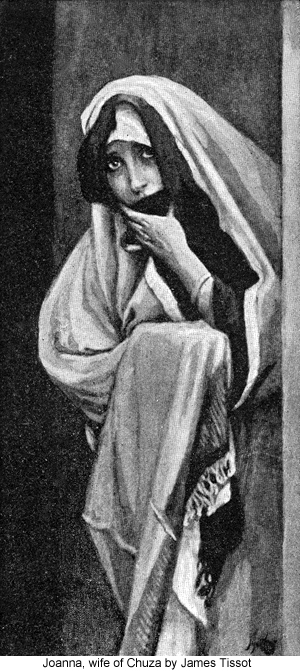
Paper 154 ON THE EVENTFUL Saturday night of April 30, as Jesus was speaking words of comfort and courage to his downcast and bewildered disciples, at Tiberias a council was being held between Herod Antipas and a group of special commissioners representing the Jerusalem Sanhedrin. These scribes and Pharisees urged Herod to arrest Jesus; they did their best to convince him that Jesus was stirring up the populace to dissension and even to rebellion. But Herod refused to take action against him as a political offender. Herod's advisers had correctly reported the episode across the lake when the people sought to proclaim Jesus king and how he rejected the proposal.
154:0.2 One of Herod's official family, Chuza, whose wife belonged to the women's ministering corps, had informed him that Jesus did not propose to meddle with the affairs of earthly rule; that he was only concerned with the establishment of the spiritual brotherhood of his believers, which brotherhood he called the kingdom of heaven. Herod had confidence in Chuza's reports, so much so that he refused to interfere with Jesus' activities. Herod was also influenced at this time, in his attitude toward Jesus, by his superstitious fear of John the Baptist. Herod was one of those apostate Jews who, while he believed nothing, feared everything. He had a bad conscience for having put John to death, and he did not want to become entangled in these intrigues against Jesus. He knew of many cases of sickness which had been apparently healed by Jesus, and he regarded him as either a prophet or a relatively harmless religious fanatic.
154:0.3 When the Jews threatened to report to Caesar that he was shielding a traitorous subject, Herod ordered them out of his council chamber. Thus matters rested for one week, during which time Jesus prepared his followers for the impending dispersion.
154:3.1 On May 16 the second conference at Tiberias between the authorities at Jerusalem and Herod Antipas was convened. Both the religious and the political leaders from Jerusalem were in attendance. The Jewish leaders were able to report to Herod that practically all the synagogues in both Galilee and Judea were closed to Jesus' teachings. A new effort was made to have Herod place Jesus under arrest, but he refused to do their bidding. On May 18, however, Herod did agree to the plan of permitting the Sanhedrin authorities to seize Jesus and carry him to Jerusalem to be tried on religious charges, provided the Roman ruler of Judea concurred in such an arrangement. Meanwhile, Jesus' enemies were industriously spreading the rumor throughout Galilee that Herod had become hostile to Jesus, and that he meant to exterminate all who believed in his teachings.
154:3.2 On Saturday night, May 21, word reached Tiberias that the civil authorities at Jerusalem had no objection to the agreement between Herod and the Pharisees that Jesus be seized and carried to Jerusalem for trial before the Sanhedrin on charges of flouting the sacred laws of the Jewish nation. Accordingly, just before midnight of this day, Herod signed the decree which authorized the officers of the Sanhedrin to seize Jesus within Herod's domains and forcibly to carry him to Jerusalem for trial. Strong pressure from many sides was brought to bear upon Herod before he consented to grant this permission, and he well knew that Jesus could not expect a fair trial before his bitter enemies at Jerusalem.


